UNIT 7 ART LESSON 2 课件(共35张,内嵌视频)高中英语北师大版(2019)必修第三册
文档属性
| 名称 | UNIT 7 ART LESSON 2 课件(共35张,内嵌视频)高中英语北师大版(2019)必修第三册 |
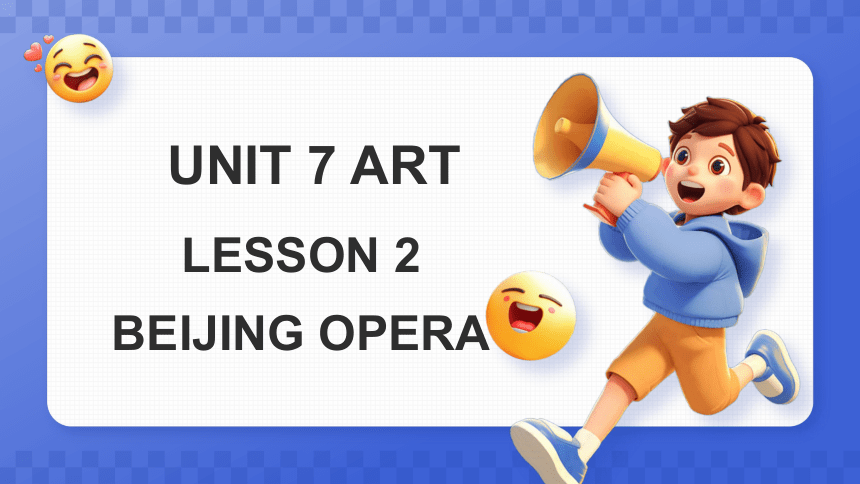
|
|
| 格式 | pptx | ||
| 文件大小 | 41.6MB | ||
| 资源类型 | 教案 | ||
| 版本资源 | 北师大版(2019) | ||
| 科目 | 英语 | ||
| 更新时间 | 2024-12-23 00:00:00 | ||
图片预览

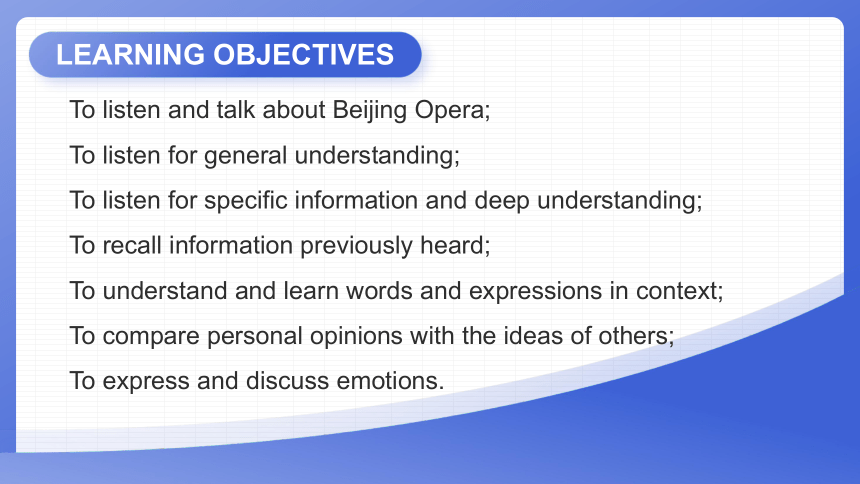
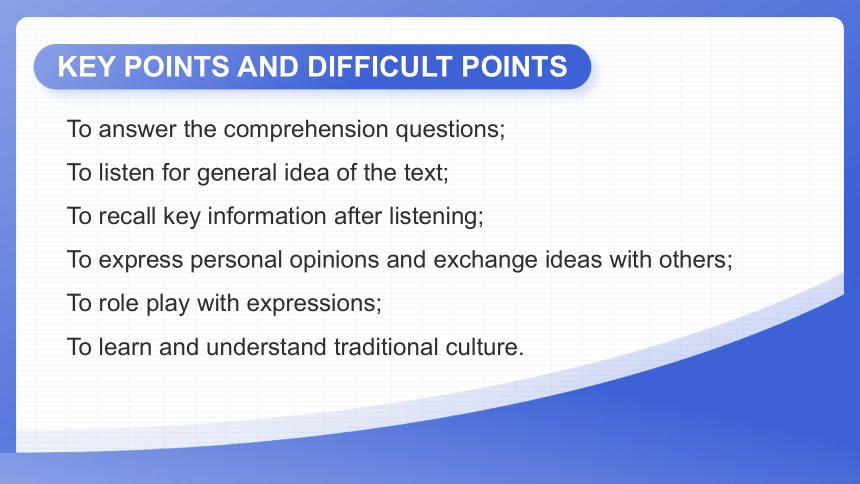
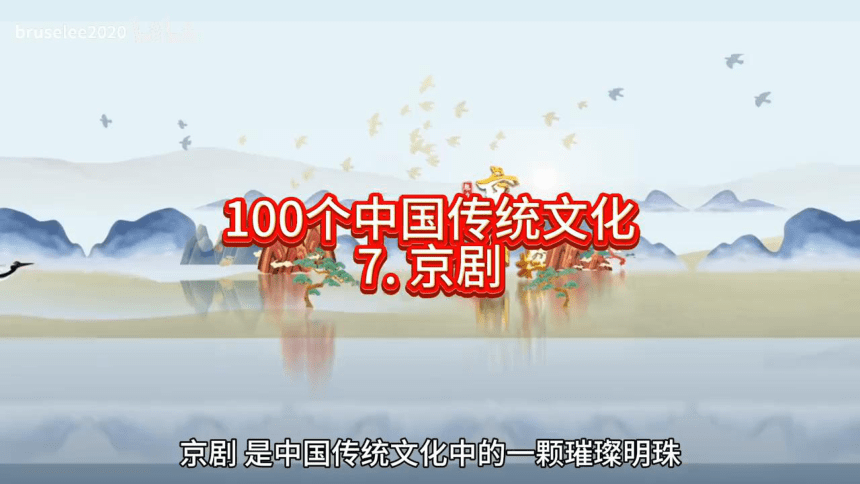
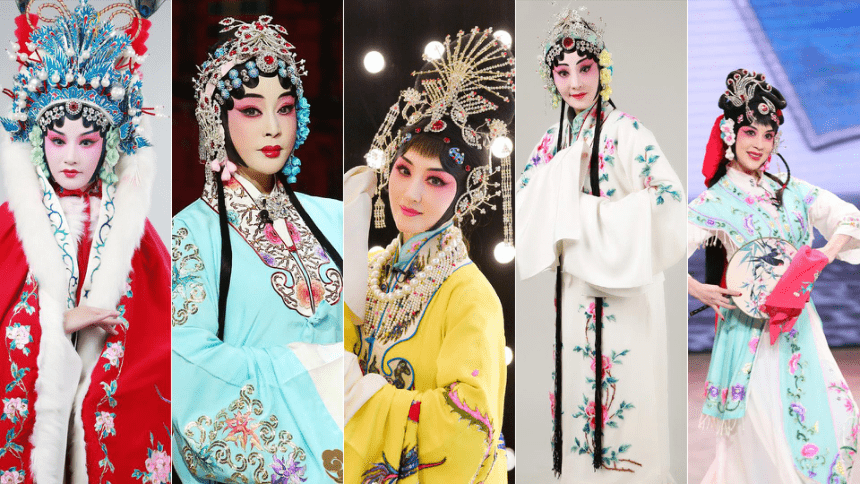
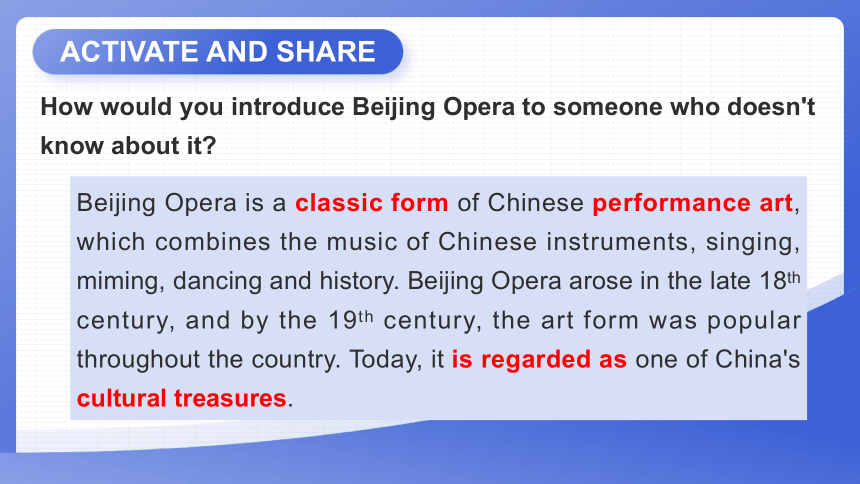
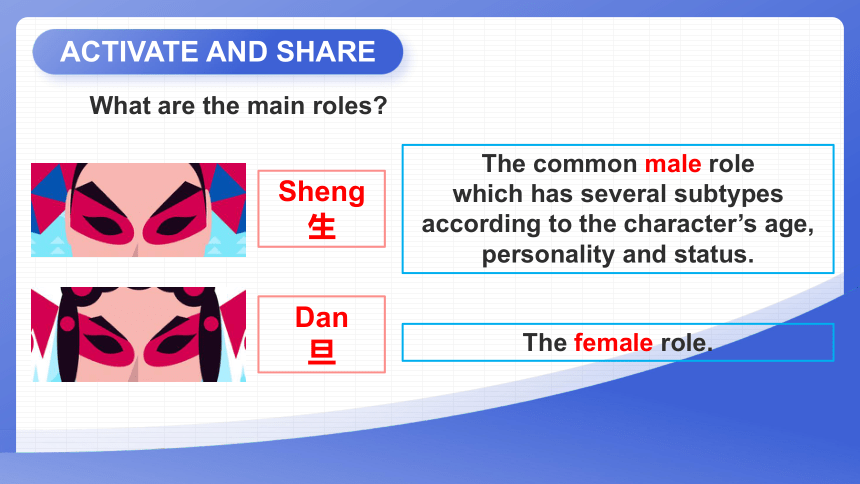
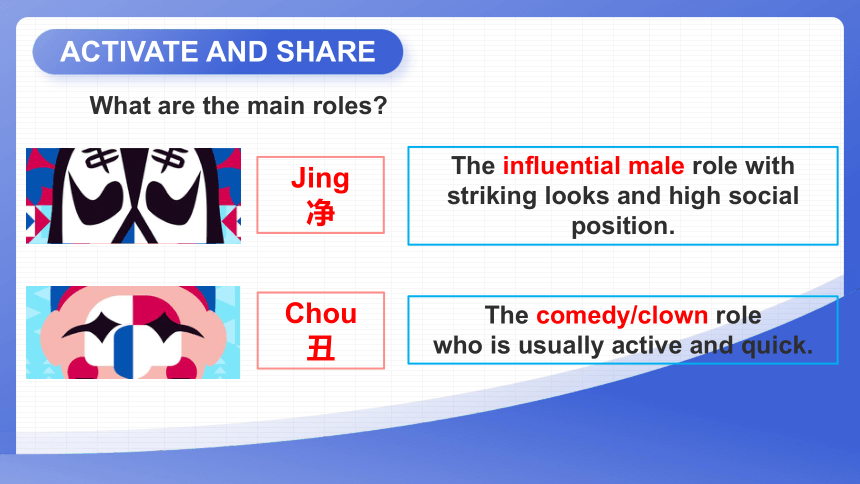
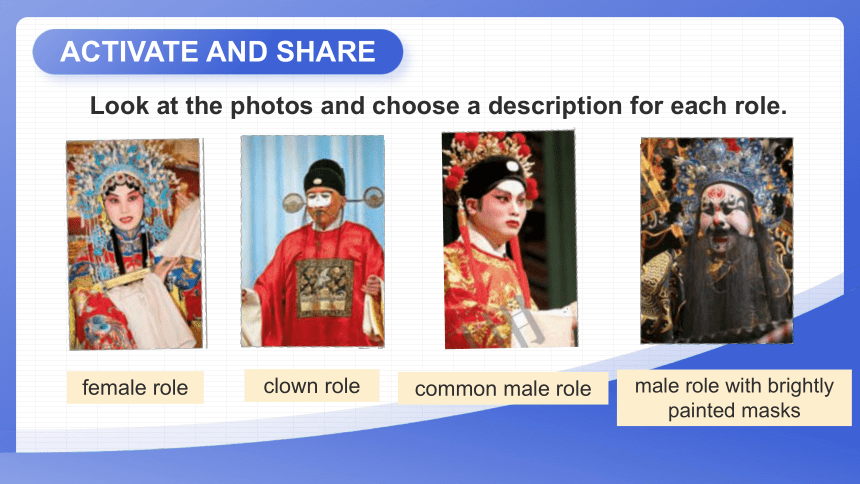
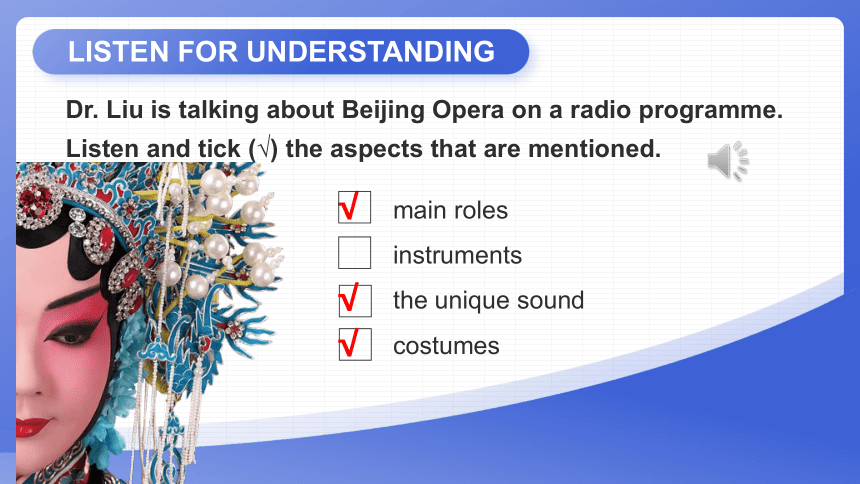
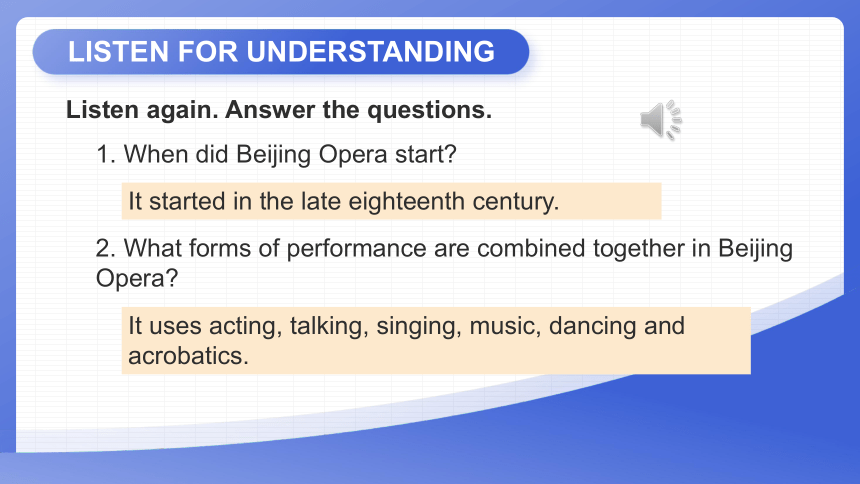

文档简介
(共35张PPT)
LESSON 2
BEIJING OPERA
UNIT 7 ART
To listen and talk about Beijing Opera;
To listen for general understanding;
To listen for specific information and deep understanding;
To recall information previously heard;
To understand and learn words and expressions in context;
To compare personal opinions with the ideas of others;
To express and discuss emotions.
LEARNING OBJECTIVES
To answer the comprehension questions;
To listen for general idea of the text;
To recall key information after listening;
To express personal opinions and exchange ideas with others;
To role play with expressions;
To learn and understand traditional culture.
KEY POINTS AND DIFFICULT POINTS
LEADING IN
ACTIVATE AND SHARE
How would you introduce Beijing Opera to someone who doesn't know about it
Beijing Opera is a classic form of Chinese performance art, which combines the music of Chinese instruments, singing, miming, dancing and history. Beijing Opera arose in the late 18th century, and by the 19th century, the art form was popular throughout the country. Today, it is regarded as one of China's cultural treasures.
ACTIVATE AND SHARE
What are the main roles
Sheng
生
Dan
旦
The common male role
which has several subtypes according to the character’s age, personality and status.
The female role.
ACTIVATE AND SHARE
What are the main roles
Jing
净
Chou
丑
The influential male role with striking looks and high social position.
The comedy/clown role
who is usually active and quick.
ACTIVATE AND SHARE
Look at the photos and choose a description for each role.
female role
clown role
common male role
male role with brightly painted masks
LISTEN FOR UNDERSTANDING
Dr. Liu is talking about Beijing Opera on a radio programme. Listen and tick (√) the aspects that are mentioned.
√
main roles
instruments
the unique sound
costumes
√
√
LISTEN FOR UNDERSTANDING
Listen again. Answer the questions.
1. When did Beijing Opera start
2. What forms of performance are combined together in Beijing Opera
It started in the late eighteenth century.
It uses acting, talking, singing, music, dancing and acrobatics.
LISTEN FOR UNDERSTANDING
Listen again. Answer the questions.
3. How many roles can be found in Beijing Opera What are they
4. What are some of the special features of Beijing Opera
There are four roles: sheng, dan, jing, chou.
It has a very unique sound and beautiful costumes.
LISTEN FOR UNDERSTANDING
Listen again and find the answers to these questions. Take notes.
Skill Builder
Understanding Logical Relationships
Logical relationships usually refer to the inner relationships between / among things, like between causes and effects.
While you are listening, listen for key words like why and because.
Take note of the reasons.
LISTEN FOR UNDERSTANDING
Listen again and find the answers to these questions. Take notes.
1. Why is Beijing Opera a national treasure of China
Beijing Opera is a national treasure of China because it uses acting, talking, singing, music, dancing and acrobatics. All of those forms are difficult to master.
LISTEN FOR UNDERSTANDING
Listen again and find the answers to these questions. Take notes.
2. Why do performers sing in very high voices
Performers sing with very high voices because in the early days, it was usually performed on open–air stages. In order to be heard over the crowds, the music had to be loud and performers had to sing in very high voices.
LISTEN FOR UNDERSTANDING
Listen again and find the answers to these questions. Take notes.
3. Why are the costumes in bright colours
Costumes are in bright colours because in the past, it was often performed on stages that were lit only by oil lamps. The costumes had to have bright and colourful patterns. Otherwise, it would have been difficult to attract the audience's attention.
LISTEN FOR UNDERSTANDING
Listen again. List the key phrases used by Dr. Liu to give reasons. Then, talk about whether you like Beijing Opera. Give your reasons.
Key phrases used by Dr. Liu to give reasons:
Yes. That's why …
This is because …
In order to …
Otherwise, …
(P=Presenter L=Dr. Liu)
P: On today's programme, we're going to discuss Beijing Opera with Dr. Liu.
L: Hello, everyone!
P: So, Dr. Liu, what is Beijing Opera and when did it start
L: Well, Beijing Opera is a form of Chinese opera which combines acting, talking, singing, music, dancing and acrobatics together and it started in the late eighteenth century.
P: OK. It uses acting, talking, singing, music, dancing and
TAPESCRIPTS
acrobatics. All of those are difficult to master!
L: Yes. That's why it's one of China's national treasures.
P: Indeed! It is said that there are four roles Beijing Opera performers can play. What are they
L: The four roles are: sheng, which are common male roles; dan, which are female roles; jing, which are male roles with brightly painted masks; and chou, which are clown roles. Each role has its own singing and acting styles.
P: I see. We know Beijing Opera has a very unique sound. Can you
TAPESCRIPTS
TAPESCRIPTS
tell us more
L: Sure. l think you're referring to the fact that performers often sing with very high voices. This is because in the early days, Beijing Opera was usually performed on open-air stages. In order to be heard over the crowds, the music had to be loud and performers had to sing in very high voices.
P: Wow, I'm definitely learning something new here. I'm also interested in the beautiful costumes.
TAPESCRIPTS
L: Oh, do you know why they're always in such bright colours
P: No, why
L: Well, in the past, Beijing Opera was often performed on stages that were lit only by oil lamps. The costumes had to have bright and colourful patterns. Otherwise, it would have been difficult to attract the audience's attention.
P: That's absolutely amazing. Thanks for sharing.
LISTEN FOR UNDERSTANDING
Introduce Beijing Opera to a group of students from another country.
LISTEN FOR UNDERSTANDING
Introduce Beijing Opera to a group of students from another country.
· Divided into five groups. Each group discusses one of the topics;
· Each group selects one person to be scribe and write down notes;
· Each student in the group describes the chosen topic;
· Each group writes a few complete sentences about their topic using these descriptions.
FOCUS ON FUNCTION: EXPRESSING EMOTIONS (2)
Listen to a dialogue about Beijing Opera. Answer the questions.
1. Who went to see Beijing Opera
2. How did the person feel about it
Lucy went to see Beijing Opera.
She felt that it was an excellent show.
3. What didn't the person understand
She didn't understand the part where the main character walks across the stage with a flag on each side of her.
FOCUS ON FUNCTION: EXPRESSING EMOTIONS (2)
Listen and imitate. What emotions do the speakers express Write satisfaction, worry or regret after the sentences in the Talk Builder.
1. ... so colourful and exciting! ( )
2. I'm so glad you enjoyed it. ( )
3. I was worried because... ( )
4. I loved the dancing and the acrobatics. ( )
5. The performers were so talented! ( )
6. But there were quite a few things I didn't understand. ( )
7. I wish I knew more about them. ( )
satisfaction
satisfaction
worry
satisfaction
satisfaction
regret
regret
TAPESCRIPTS
(B=Boy L=Lucy)
B: So, Lucy, how was it Did you enjoy your first Beijing Opera
L: Yes, l certainly did! It was an excellent show ... so colourful and exciting!
B: Great! I'm so glad you enjoyed it. l was worried because Beijing Opera is so different from theatre shows in the US.
L: It was very different, but in a good way! l loved the dancing and the acrobatics.
TAPESCRIPTS
B: Me, too. The performers were so talented!
L: But there were quite a few things l didn't understand.
B: Sure. Maybe l can help.
L: Well, you know the part where the main character walks across the stage with a flag on each side of her l had no idea what she was doing.
B: Oh, that means she's riding in a carriage, Simple movements in Beijing Opera often represent more complex
TAPESCRIPTS
actions, like riding a horse or rowing a boat.
L: I see! It seems like so many aspects of Beijing Opera come from ancient traditions. I wish I knew more about them.
B: Don't worry! lf you're interested, we can go and watch more Beijing Opera together. Maybe one day you'll be an expert!
SPEAK
Pair Work Act out a dialogue between a Chinese student and a foreign student after watching a local opera.
SPEAK
Pair Work Act out a dialogue between a Chinese student and a foreign student after watching a local opera.
Each pair should know:
Student A is role playing a Chinese student, Who understands the different elements of opera.
Student B is role playing a foreign student, who doesn't understand opera and asks questions.
VOCABULARY
1. master
master's degree 硕士学位,研究生
be one's own master 独立自主
master of sth. 主宰;主人;有控制力的人
masterpiece n. 杰作,绝无仅有的人
练习:Jackson remained calm and always the _________ of his emotion.
master
VOCABULARY
2. refer
refer to 提到;谈到;参考;查阅
refer…to… 把……提交给……
refer to…as… 把……称作……
reference n. 提及,涉及;参考,参考书目
refer to中的to为介词,后接名词、代词或动名词等作宾语
练习:What I have to say _________ to all of you.
refers
VOCABULARY
3. perform
perform one's duty/ promise 尽责任/ 履行诺言
perform an experiment 进行试验
perform well/ badly 表现得好/ 坏
performance n. 表演,演奏,表现,执行
give/ put on a performance 表演,演出
performer n. 表演者,演奏者
练习:The new clerk ____________ well and the manager is satisfied with him.
performs
SUMMARY
Learn some basic information about Beijing Opera;
Listen for general understanding and specific information;
Learn about and practice words and expressions in context;
Express personal opinions and exchange ideas with others;
Recall key information previously heard;
Understand and learn how to express emotions;
Talk about and understand traditional culture.
Thank you
LESSON 2
BEIJING OPERA
UNIT 7 ART
To listen and talk about Beijing Opera;
To listen for general understanding;
To listen for specific information and deep understanding;
To recall information previously heard;
To understand and learn words and expressions in context;
To compare personal opinions with the ideas of others;
To express and discuss emotions.
LEARNING OBJECTIVES
To answer the comprehension questions;
To listen for general idea of the text;
To recall key information after listening;
To express personal opinions and exchange ideas with others;
To role play with expressions;
To learn and understand traditional culture.
KEY POINTS AND DIFFICULT POINTS
LEADING IN
ACTIVATE AND SHARE
How would you introduce Beijing Opera to someone who doesn't know about it
Beijing Opera is a classic form of Chinese performance art, which combines the music of Chinese instruments, singing, miming, dancing and history. Beijing Opera arose in the late 18th century, and by the 19th century, the art form was popular throughout the country. Today, it is regarded as one of China's cultural treasures.
ACTIVATE AND SHARE
What are the main roles
Sheng
生
Dan
旦
The common male role
which has several subtypes according to the character’s age, personality and status.
The female role.
ACTIVATE AND SHARE
What are the main roles
Jing
净
Chou
丑
The influential male role with striking looks and high social position.
The comedy/clown role
who is usually active and quick.
ACTIVATE AND SHARE
Look at the photos and choose a description for each role.
female role
clown role
common male role
male role with brightly painted masks
LISTEN FOR UNDERSTANDING
Dr. Liu is talking about Beijing Opera on a radio programme. Listen and tick (√) the aspects that are mentioned.
√
main roles
instruments
the unique sound
costumes
√
√
LISTEN FOR UNDERSTANDING
Listen again. Answer the questions.
1. When did Beijing Opera start
2. What forms of performance are combined together in Beijing Opera
It started in the late eighteenth century.
It uses acting, talking, singing, music, dancing and acrobatics.
LISTEN FOR UNDERSTANDING
Listen again. Answer the questions.
3. How many roles can be found in Beijing Opera What are they
4. What are some of the special features of Beijing Opera
There are four roles: sheng, dan, jing, chou.
It has a very unique sound and beautiful costumes.
LISTEN FOR UNDERSTANDING
Listen again and find the answers to these questions. Take notes.
Skill Builder
Understanding Logical Relationships
Logical relationships usually refer to the inner relationships between / among things, like between causes and effects.
While you are listening, listen for key words like why and because.
Take note of the reasons.
LISTEN FOR UNDERSTANDING
Listen again and find the answers to these questions. Take notes.
1. Why is Beijing Opera a national treasure of China
Beijing Opera is a national treasure of China because it uses acting, talking, singing, music, dancing and acrobatics. All of those forms are difficult to master.
LISTEN FOR UNDERSTANDING
Listen again and find the answers to these questions. Take notes.
2. Why do performers sing in very high voices
Performers sing with very high voices because in the early days, it was usually performed on open–air stages. In order to be heard over the crowds, the music had to be loud and performers had to sing in very high voices.
LISTEN FOR UNDERSTANDING
Listen again and find the answers to these questions. Take notes.
3. Why are the costumes in bright colours
Costumes are in bright colours because in the past, it was often performed on stages that were lit only by oil lamps. The costumes had to have bright and colourful patterns. Otherwise, it would have been difficult to attract the audience's attention.
LISTEN FOR UNDERSTANDING
Listen again. List the key phrases used by Dr. Liu to give reasons. Then, talk about whether you like Beijing Opera. Give your reasons.
Key phrases used by Dr. Liu to give reasons:
Yes. That's why …
This is because …
In order to …
Otherwise, …
(P=Presenter L=Dr. Liu)
P: On today's programme, we're going to discuss Beijing Opera with Dr. Liu.
L: Hello, everyone!
P: So, Dr. Liu, what is Beijing Opera and when did it start
L: Well, Beijing Opera is a form of Chinese opera which combines acting, talking, singing, music, dancing and acrobatics together and it started in the late eighteenth century.
P: OK. It uses acting, talking, singing, music, dancing and
TAPESCRIPTS
acrobatics. All of those are difficult to master!
L: Yes. That's why it's one of China's national treasures.
P: Indeed! It is said that there are four roles Beijing Opera performers can play. What are they
L: The four roles are: sheng, which are common male roles; dan, which are female roles; jing, which are male roles with brightly painted masks; and chou, which are clown roles. Each role has its own singing and acting styles.
P: I see. We know Beijing Opera has a very unique sound. Can you
TAPESCRIPTS
TAPESCRIPTS
tell us more
L: Sure. l think you're referring to the fact that performers often sing with very high voices. This is because in the early days, Beijing Opera was usually performed on open-air stages. In order to be heard over the crowds, the music had to be loud and performers had to sing in very high voices.
P: Wow, I'm definitely learning something new here. I'm also interested in the beautiful costumes.
TAPESCRIPTS
L: Oh, do you know why they're always in such bright colours
P: No, why
L: Well, in the past, Beijing Opera was often performed on stages that were lit only by oil lamps. The costumes had to have bright and colourful patterns. Otherwise, it would have been difficult to attract the audience's attention.
P: That's absolutely amazing. Thanks for sharing.
LISTEN FOR UNDERSTANDING
Introduce Beijing Opera to a group of students from another country.
LISTEN FOR UNDERSTANDING
Introduce Beijing Opera to a group of students from another country.
· Divided into five groups. Each group discusses one of the topics;
· Each group selects one person to be scribe and write down notes;
· Each student in the group describes the chosen topic;
· Each group writes a few complete sentences about their topic using these descriptions.
FOCUS ON FUNCTION: EXPRESSING EMOTIONS (2)
Listen to a dialogue about Beijing Opera. Answer the questions.
1. Who went to see Beijing Opera
2. How did the person feel about it
Lucy went to see Beijing Opera.
She felt that it was an excellent show.
3. What didn't the person understand
She didn't understand the part where the main character walks across the stage with a flag on each side of her.
FOCUS ON FUNCTION: EXPRESSING EMOTIONS (2)
Listen and imitate. What emotions do the speakers express Write satisfaction, worry or regret after the sentences in the Talk Builder.
1. ... so colourful and exciting! ( )
2. I'm so glad you enjoyed it. ( )
3. I was worried because... ( )
4. I loved the dancing and the acrobatics. ( )
5. The performers were so talented! ( )
6. But there were quite a few things I didn't understand. ( )
7. I wish I knew more about them. ( )
satisfaction
satisfaction
worry
satisfaction
satisfaction
regret
regret
TAPESCRIPTS
(B=Boy L=Lucy)
B: So, Lucy, how was it Did you enjoy your first Beijing Opera
L: Yes, l certainly did! It was an excellent show ... so colourful and exciting!
B: Great! I'm so glad you enjoyed it. l was worried because Beijing Opera is so different from theatre shows in the US.
L: It was very different, but in a good way! l loved the dancing and the acrobatics.
TAPESCRIPTS
B: Me, too. The performers were so talented!
L: But there were quite a few things l didn't understand.
B: Sure. Maybe l can help.
L: Well, you know the part where the main character walks across the stage with a flag on each side of her l had no idea what she was doing.
B: Oh, that means she's riding in a carriage, Simple movements in Beijing Opera often represent more complex
TAPESCRIPTS
actions, like riding a horse or rowing a boat.
L: I see! It seems like so many aspects of Beijing Opera come from ancient traditions. I wish I knew more about them.
B: Don't worry! lf you're interested, we can go and watch more Beijing Opera together. Maybe one day you'll be an expert!
SPEAK
Pair Work Act out a dialogue between a Chinese student and a foreign student after watching a local opera.
SPEAK
Pair Work Act out a dialogue between a Chinese student and a foreign student after watching a local opera.
Each pair should know:
Student A is role playing a Chinese student, Who understands the different elements of opera.
Student B is role playing a foreign student, who doesn't understand opera and asks questions.
VOCABULARY
1. master
master's degree 硕士学位,研究生
be one's own master 独立自主
master of sth. 主宰;主人;有控制力的人
masterpiece n. 杰作,绝无仅有的人
练习:Jackson remained calm and always the _________ of his emotion.
master
VOCABULARY
2. refer
refer to 提到;谈到;参考;查阅
refer…to… 把……提交给……
refer to…as… 把……称作……
reference n. 提及,涉及;参考,参考书目
refer to中的to为介词,后接名词、代词或动名词等作宾语
练习:What I have to say _________ to all of you.
refers
VOCABULARY
3. perform
perform one's duty/ promise 尽责任/ 履行诺言
perform an experiment 进行试验
perform well/ badly 表现得好/ 坏
performance n. 表演,演奏,表现,执行
give/ put on a performance 表演,演出
performer n. 表演者,演奏者
练习:The new clerk ____________ well and the manager is satisfied with him.
performs
SUMMARY
Learn some basic information about Beijing Opera;
Listen for general understanding and specific information;
Learn about and practice words and expressions in context;
Express personal opinions and exchange ideas with others;
Recall key information previously heard;
Understand and learn how to express emotions;
Talk about and understand traditional culture.
Thank you
同课章节目录
- Unit 7 Art
- Lesson 1 Masterpieces
- Lesson 2 Beijing Opera
- Lesson 3 A Musical Genius
- Unit 8 Green living
- Lesson 1 Roots and Shoots
- Lesson 2 Greening the Desert
- Lesson 3 "White Bikes" on the Road
- Unit 9 Learning
- Lesson 1 Active Learning
- Lesson 2 Language Learning Tips
- Lesson 3 The Secrets of Your Memory
